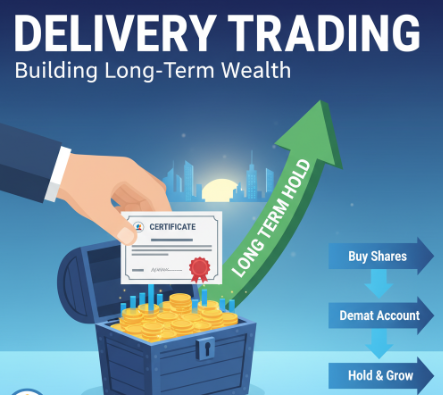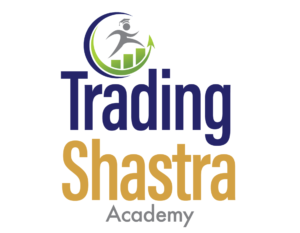What is Delivery Trading? — Complete Guide to Delivery Trading in India (2025)

Introduction
Trading is not just about intraday moves and quick profits. A large segment of Indian traders prefer delivery trading, where you buy shares and take actual delivery into your Demat account. If you are new and wondering what is delivery trading, this guide will cover the meaning, rules, benefits, risks, and practical steps to get started in India.
Delivery Trading — Meaning & How It Works
So, what is delivery trading? In simple terms, delivery trading means buying shares and holding them beyond the trading day. Once you purchase a stock, it gets credited to your Demat account within the exchange settlement cycle (currently T+1 in India, as per NSE rules). Unlike intraday, you don’t need to square-off your position on the same day. You can hold stocks for days, months, or even years.
For example, if you buy 100 shares of Infosys at ₹1,500 in delivery, those shares remain in your Demat account until you decide to sell them — whether after 2 days or 2 years.
Delivery Trading vs Intraday Trading
Delivery trading and intraday trading serve different purposes. In intraday, traders must close positions before the market closes. In delivery, you can hold shares for as long as you want. Let’s compare:
| Aspect | Delivery Trading | Intraday Trading |
|---|---|---|
| Holding | Unlimited, until you sell | Same day only |
| Settlement | T+1 cycle (Demat credit) | Same day square-off |
| Taxation | Capital Gains | Business Income |
Steps to Place a Delivery Trade in India
- Open a Demat + Trading account with a SEBI-registered broker.
- Add funds to your trading account.
- Search the stock you want to buy.
- Select the “Delivery / CNC” option when placing an order.
- Pay full amount; shares will be credited to your Demat within T+1 days.
Rules, Charges & Settlement
When doing delivery trading in India, you should know about brokerage and charges:
- Brokerage (varies by broker, usually flat per order).
- DP Charges (for holding in Demat, usually ₹15–₹25 per script sell).
- STT (Securities Transaction Tax).
- Exchange Transaction Charges (NSE/BSE).
- GST on brokerage & charges.
Settlement is now on T+1 basis as per SEBI guidelines. This means if you buy shares on Monday, they will be credited to your Demat by Tuesday.
Benefits of Delivery Trading
Delivery trading has multiple benefits compared to intraday or margin trades:
- ✅ Flexibility to hold stocks for any duration.
- ✅ Eligible for dividends, bonuses, and rights issues.
- ✅ Lower stress compared to intraday trading.
- ✅ Treated as investment for taxation, eligible for capital gains.
- ✅ Safer for beginners who want to learn markets gradually.
Risks of Delivery Trading
No trading style is risk-free. Delivery trading carries its own risks:
- 📉 Market risk — stock prices can fall after you buy.
- 💸 Capital lock-in — money remains tied until you sell.
- ⚡ No leverage — unlike intraday, delivery requires full upfront payment.
- ⏳ Opportunity cost — while holding long-term, other opportunities may be missed.
How Trading Shastra Teaches Delivery Trading
At Trading Shastra Academy, we don’t just explain what is delivery trading — we train you to use it strategically. Our programs include live mentorship, capital-backed trading, and internship certification. Students practice delivery and intraday trades with real funds, while all losses are covered by the academy.
| Program | Capital | Stipend | Certification |
|---|---|---|---|
| Ultra Supreme Trader | ₹50,00,000 | ₹15,000 | Internship Certification |
| Supreme Trader A | ₹25,00,000 | ₹11,000 | Internship Certification |
| Supreme Trader B | ₹10,00,000 | ₹5,500 | Internship Certification |
Frequently Asked Questions
What is delivery trading?
Delivery trading means buying shares and holding them in your Demat account beyond the settlement day, instead of squaring off same-day like intraday.
Do I need a Demat account for delivery trading?
Yes, a Demat account is mandatory because shares are credited and stored there after purchase.
Can I sell delivery shares on the same day?
Yes, you can sell them, but that becomes intraday. If you want true delivery, hold beyond the same day.
Is delivery trading taxable?
Yes. Profits from delivery trading are taxed as capital gains under Indian tax rules.
Is delivery trading good for beginners?
Yes. It is safer than intraday because it allows you to hold and learn without pressure to exit in one day.
🚀 Ready to learn delivery trading with experts? Join Trading Shastra Academy for structured training, mentorship, and capital-backed practice.
Enroll NowEmail: info@tradingshastra.com
Phone: +91 9717333285
This blog is for educational purposes only. Stock market investments are subject to risks. Please do thorough research before investing.
